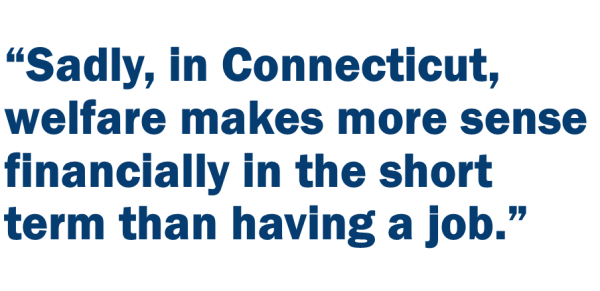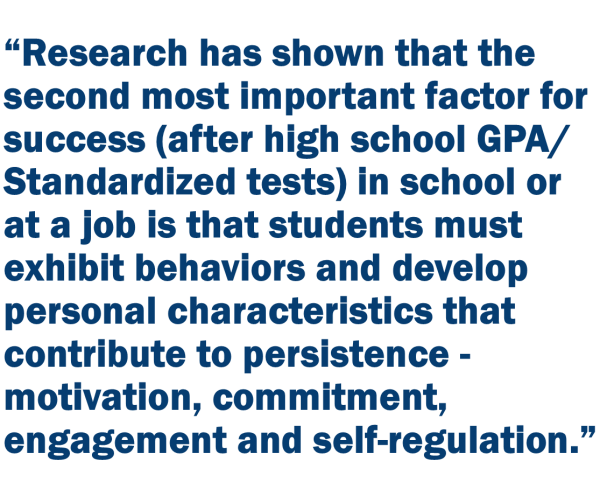PERSPECTIVE: Building a Foundation to Reduce Reliance on Social Welfare
/by Martha Guidry According to Forbes, an individual on social welfare in Connecticut collects on average $25/day, which equals over $9,000 a year. A 2013 Hartford Courant article stated that a mother with two children participating in seven major welfare programs (Temporary Assistance for Needy Families, Medicaid, food stamps, WIC housing assistance, utility assistance and free commodities) could receive a package of benefits worth $38,761 (untaxed $106/day), the fourth highest in the nation behind Washington, DC, Hawaii, and Massachusetts.
Social welfare is not taxed, while wages are. Using the Connecticut state tax calculator for 2017-18, a mother with two children in Connecticut would have to earn $48,500 ($23.32 per hour) for her family to be better off than they would be on welfare. That's more than double the current minimum wage of $10.10 and more than 14 percent higher the $42,494 starting wage of a teacher in Connecticut. Even scarier, that mother would have to hold 2.3 full-time jobs at minimum wage to reach this salary. Bear in mind, this does not include the cost of daycare, wardrobe, transportation or other expenditures required to hold a job 40 hours per week. 
Sadly, in Connecticut, welfare makes more sense financially in the short term than having a job. Unfortunately, this will likely hurt an individual in the long term as having a job is one of the many important steps to ultimately breaking the cycle of poverty.
How can we help stop this cycle of social welfare reliance? Two potential solutions exist: 1) policy changes and 2) provide children with the opportunity to learn how to work to improve their chances regardless of whether they get a degree above high school. According to National Clearinghouse Data, in Hartford, only 2 out of every 10 graduates earn a degree above high school after 6 years.
According to Michael Tanner in his Hartford Courant article (August 2013), “if reducing welfare dependence and rewarding work is the goal, Connecticut legislators should consider ways to shrink the gap between the value of welfare and work by reducing current benefit levels and tightening eligibility requirements.” He continues on to say that Congress should remove exemptions and narrow the definition of work to enhance welfare work requirements.
 While policy changes would be ideal, at the Capital City Education Alliance, a Hartford-based nonprofit, we attack option two. In our signature program, Let’s Paint!, we engage students thru hands on learning on color theory, design and early intervention workforce readiness skills as they learn commercial painting skills.
While policy changes would be ideal, at the Capital City Education Alliance, a Hartford-based nonprofit, we attack option two. In our signature program, Let’s Paint!, we engage students thru hands on learning on color theory, design and early intervention workforce readiness skills as they learn commercial painting skills.
Since our start in May 2016, we’ve had 106 students work with the Let’s Paint! staff using over 376 gallons of paint and working over 7,390 total student hours. These students have transformed a variety of spaces including a 24-bay graffiti-covered garage by Route 84; the Southwest Boys & Girls Club career center and building exterior; hallways, the auditorium, and the office at Burns Latino (South End) and the lobby and several hallways at West Middle School (Asylum Hill).
Research has shown that the second most important factor for success (after high school GPA/Standardized tests) in school or at a job is that students must exhibit behaviors and develop personal characteristics that contribute to persistence - namely motivation, commitment, engagement and self-regulation. Let's Paint! is designed to specifically focus in these areas of need that are not directly addressed in school curriculum.
CCEA believes that patterning behaviors right and providing positive/opportunistic feedback at the start helps teach the life and job success skills. To this end, students must complete an application and interview with our staff to be part of the “paint crew”. Each program day, students must formally greet a staff member with a "confident" handshake to practice this important skill. Students are also evaluated on their work skills such as teamwork, having a positive attitude, and being properly dressed for work. With regular, positive attendance, students also receive a small stipend to take their “job” seriously. And, just like in the real world, they are docked pay for being late!
Adult volunteers also contribute to workforce readiness. On scheduled days, volunteers informally mentor the kids while painting side-by-side, thus providing an opportunity for the students to practice workforce soft skills - eye contact, greetings, shaking hands, and engaging in conversation – while the adults have lots of fun.
In Summer 2018, CCEA will launch its adjunct program “Broken 2 Beautiful” (B2B) where graduates of “Let’s Paint!” will have the opportunity to rejoin the staff for ongoing work experience, financial literacy and career engagement learning. Painting will also play a role in B2B. Students will refinish furniture and record crates with bold colors as well as do “pop up” exterior painting projects through the greater Hartford area.
- The former will be part of a social enterprise to sell the goods allowing youth to learn about all the different careers that may be open to them in Hartford – sales, marketing, operations, etc. – to broader their views of jobs.
- The latter will continue their involvement in community service to make their city a more beautiful place and feel the success of making a difference. In addition, students will learn about financial literacy and budgeting. One of the best ways to work oneself out of poverty is to actually understand that one can’t spend more than one earns!
We can’t change policy, but we can help change the skill sets of our students. Consider volunteering, donating and attending our events to help us achieve success and, just possibly, reduce some of Connecticut’s 80+ social welfare programs.
_________________________________________
Martha Guidry is Executive Director of the Capital City Education Alliance, which lays the foundation for workforce readiness by inspiring and empowering pre-teen and teens in Greater Hartford through project and partnership that build character, skills and pathways to success. Individuals 18 years of age or older may sign up on the CCEA website to volunteer, as well as teenagers with an accompanying adult. Corporate teams are also welcome to participate on Tuesday afternoons; contact Colleen@CCEAHartford.org for more details, and learn more at www.CCEAHartford.org
































